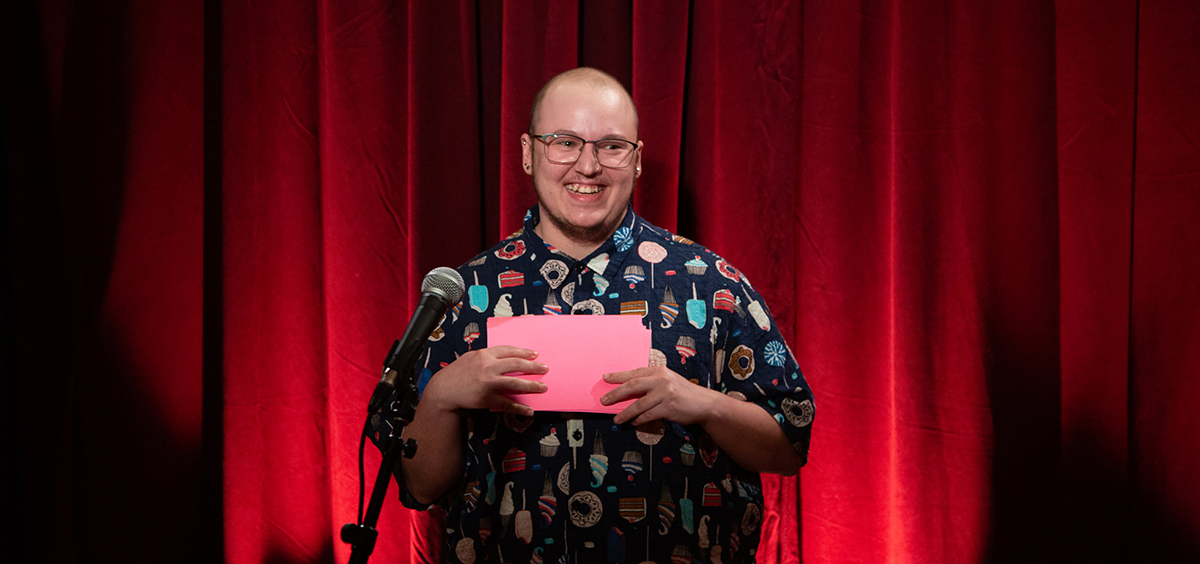“… there is… art that is revolutionary simply because it tells the truth when it seems like others cannot. And when that truth is coming from places that are often underrepresented – especially places of struggle – it can be the most powerful form of art in the world.”
– Ijeoma Oluo

One thing you can’t tell by looking at me is…that I think garden gnomes are creepy as hell.
A little bit about me:
I’ve been a storyteller with TMI Project since 2018, a workshop leader since 2021, and working full time for the organization for a year. Additionally, I’m a multi-genre writer, storyteller and director who specializes in social action theatre and autobiographical nonfiction. When people ask me what I want to do with my life, my answer is simple: “I want to make art and help people” – a mantra that I feel TMI Project fulfills wholeheartedly.
I’ve been to many a protest, spoken my own suicide survival story nationally for The Trevor Project in support of their suicide prevention chat line, and have long been the feminist killjoy and token trans friend.
Why do I think people should apply to Stories for Freedom?
In Ijeoma Oluo’s book “Be A Revolution,” she says “Some art is revolutionary by design. It sets out to tackle oppressive systems or harmful narratives. It is openly and intentionally defiant of the status quo. […] But there is also art that is revolutionary simply because it tells the truth when it seems like others cannot. And when that truth is coming from places that are often underrepresented – especially places of struggle – it can be the most powerful form of art in the world.”
And, well, I couldn’t agree more.
When doing the work of liberation – any kind of liberation – it can be hard to get people to sit down and listen to you. You could share the stats, the research, a plethora of data to back up why your cause is important, and people just won’t listen. It’s boring or it bums them out or they can’t connect to what you’re telling them.
Storytelling, however, captivates people. It makes the work that you’ve been doing palpable to those who aren’t steeped in it every day. It answers the all-important question people will always ask you: Why? Why should I care? It reminds people that working towards freedom isn’t about statistics, it’s about, well, freedom. It’s about having access to one’s own humanity and ability to live. When someone sits down and comes face to face, heart to heart, and listens to a storyteller experience real, human moments of struggle or revelry, they can see what you see: that freedom is what makes life worth living – and every single human is deserving of that.
How have I experienced freedom through storytelling?
In the story I most recently developed with TMI Project, I let the world know about the abuse I had suffered at the hands of transphobic doctors when trying to refill a routine hormone prescription. It was an experience I had never spoken about publicly before, even to some of my closest friends. It was an experience that filled me with shame and embarrassment – and a part of me stayed quiet simply out of fear of retaliation from the medical practice that abused me.
Telling my story freed me from that weight. It allowed me to realize that I had nothing to be ashamed of. After sharing that story, I became a fierce advocate for myself in any doctor’s office I enter. I’ve never felt more free and in control than I now do when I shut down transphobic, fatphobic rhetoric. Additionally, it allowed me the opportunity to connect with other trans people who had been through similar experiences and help them realize that what was happening to them was not okay. And – most importantly – my story has now been recorded and is being used in a collection to train tens of thousands of medical care providers. Just by opening up and telling my story I was not only personally liberated from my trauma and fear – I now get to help people all over the world.
Is there a changemaker that inspires you to fight for freedom through their storytelling?
As a theatre maker myself, it is when real, historic experiences are turned into art that I get most inspired. Kate Davis’s documentary “Southern Comfort”, which chronicles the life of Robert Eads, a trans man dying of ovarian cancer (but really, medical neglect and transphobia) in rural Georgia is the first one that comes to mind. As a trans person who has experienced medical trauma, watching trans people cope with that trauma and find beauty in a hard life made me feel like a happy, trans life was possible. It’s sad and beautiful and gosh, it makes me so angry – a type of anger that makes me want to fight like hell for my trans siblings. The documentary eventually was made into a musical that reached an even wider audience. I think Davis’s ability to capture the story of not just Robert Eads, but his entire trans found-family, shows how focusing on the stories that need to be told most can change the world.

No comment yet, add your voice below!